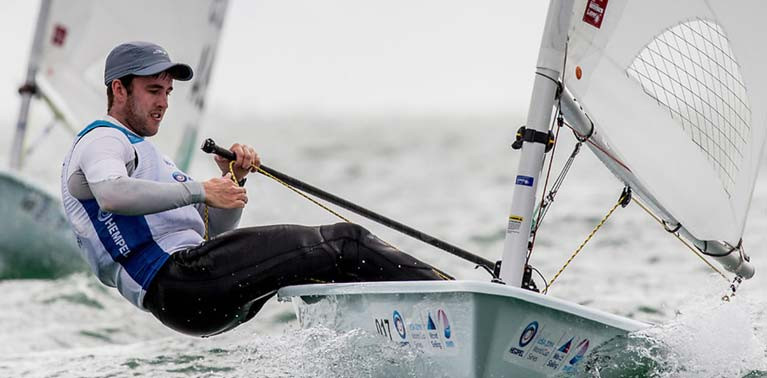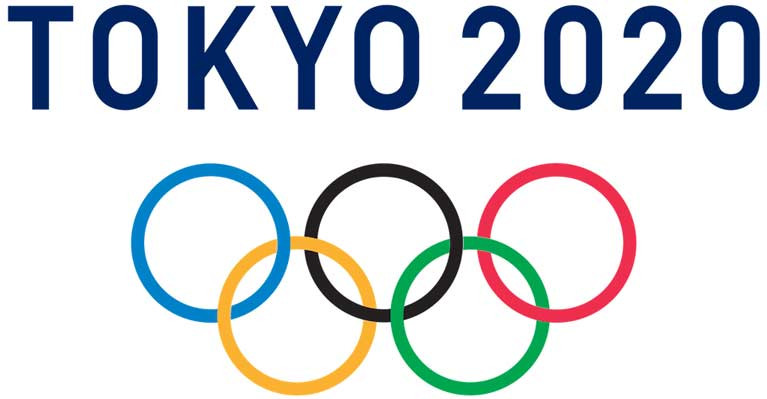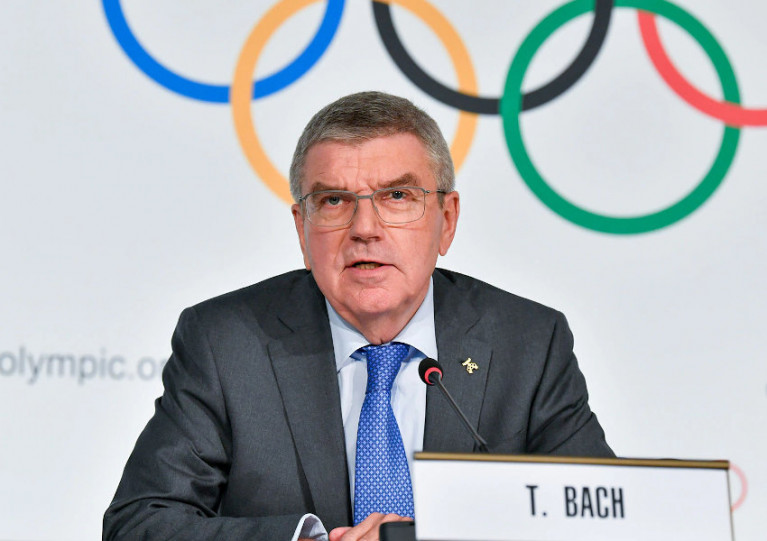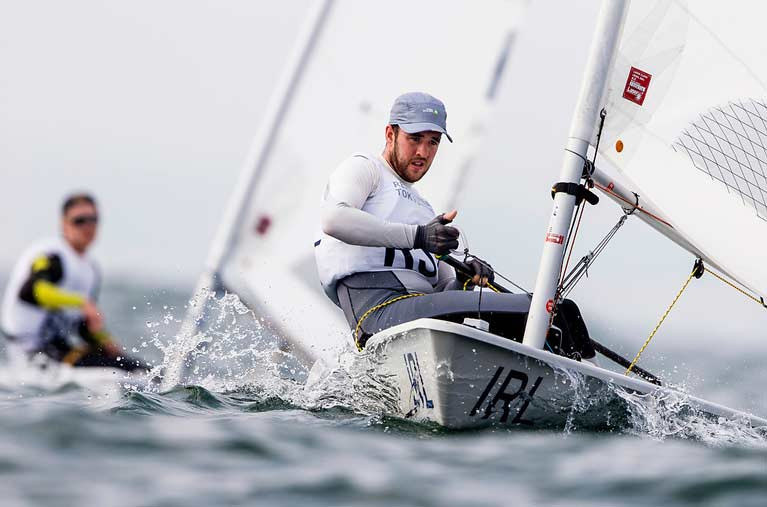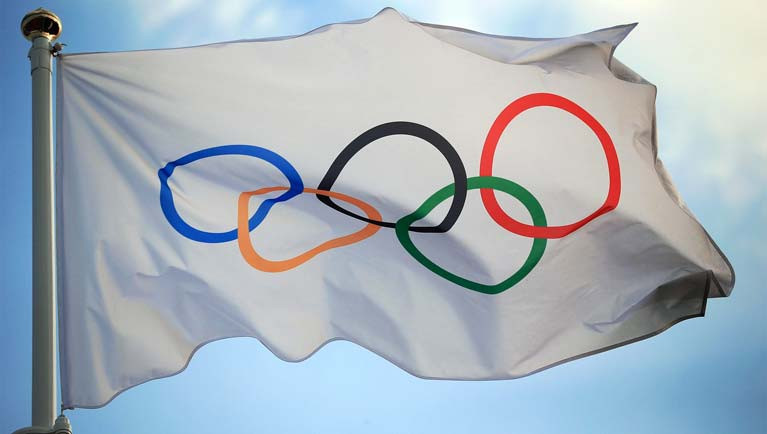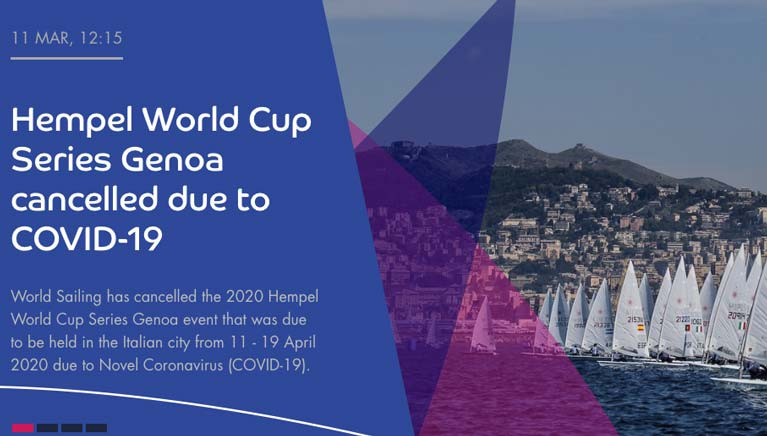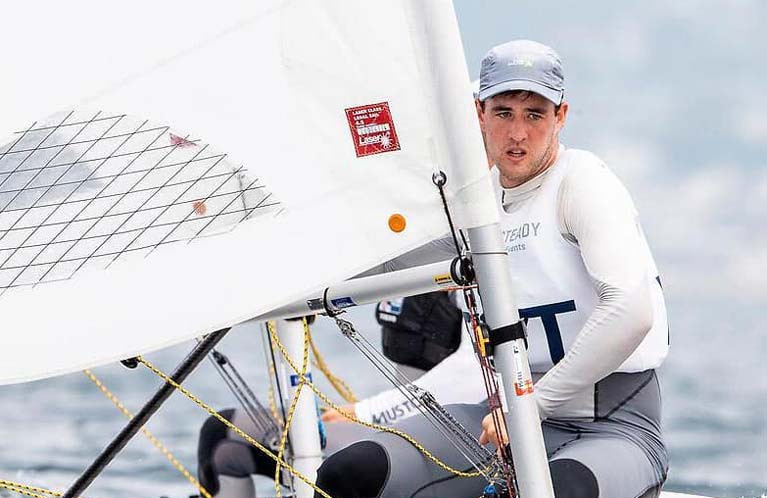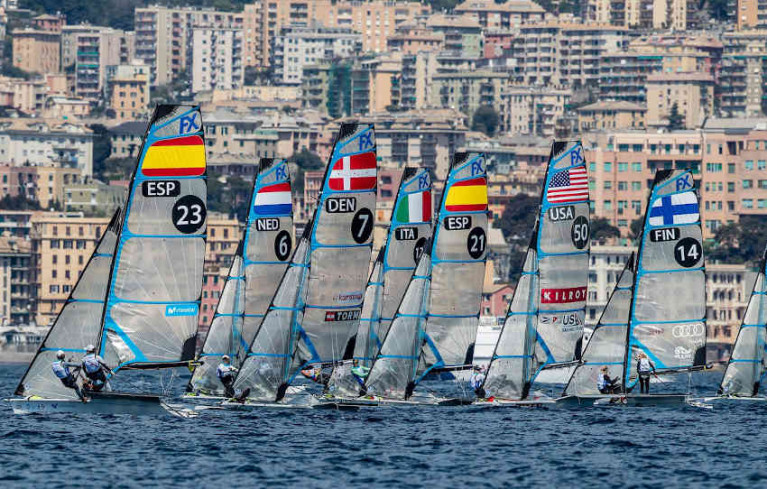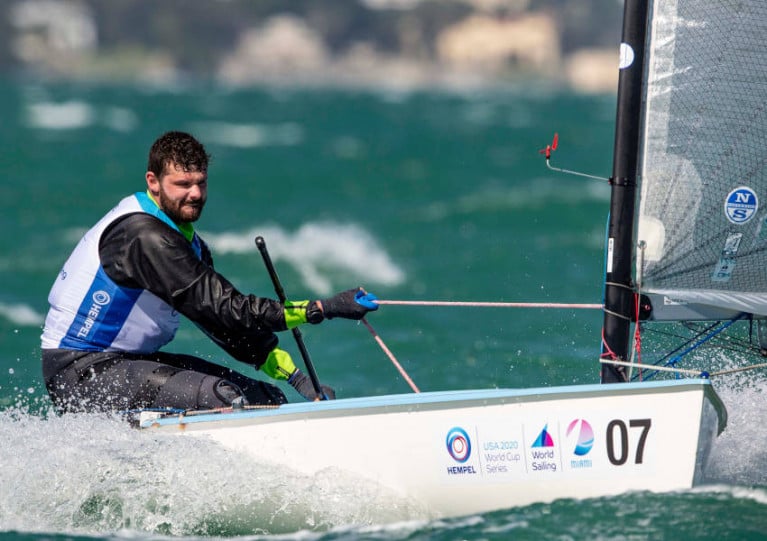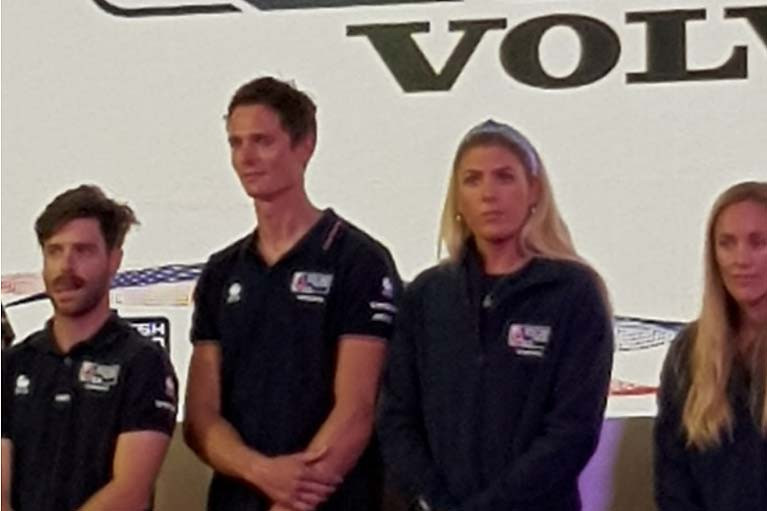Displaying items by tag: Tokyo 2020
Irish sailors seeking the last qualification places for the Tokyo 2021 Olympic Games will have to wait till late 2020 or early 2021 for those events to take place, according to World Sailing.
The news follows the postponement of the Tokyo Games as Afloat reported earlier. In response, World Sailing it will not hold Olympic qualification events for Africa, Asia or Europe in the short term.
An Irish Laser Radial has qualified for Tokyo but the fate of two other Irish boats is in last chance selection at these now rescheduled qualification events for the men's Laser and 49er dinghy respectively.
World Sailing will now work with the IOC and Tokyo 2020 on timing of the postponed Olympic Games, necessary adaptations to Games delivery plans and Olympic qualification systems.
The IOC President and the Prime Minister of Japan have concluded that the Games of the XXXII Olympiad in Tokyo must be rescheduled to a date "beyond 2020 but not later than summer 2021, to safeguard the health of the athletes, everybody involved in the Olympic Games and the international community.”
World Sailing, the world governing body of the sport, supports the IOC and Tokyo 2020 Organising Committee decision to ensure the health and well-being of athletes, fans and support personnel worldwide.
President Kim Andersen and the World Sailing Executive Office are in direct communication with the IOC Sports Department. The IOC is engaging with World Sailing to develop the necessary plans in full partnership and to ensure full transparency with a focus on information for World Sailing and the athletes.
In the short term, World Sailing will not hold Olympic qualification events for Africa, Asia or Europe. World Sailing is working with the IOC on an update to the qualification system where its recommendation will be to look at hosting qualifications events in late 2020 or early 2021.
World Sailing will now work with the IOC and Tokyo 2020 on the timing of the postponed Olympic Games, necessary adaptations to Games delivery plans and Olympic qualification systems.
Following the IOC decision, World Sailing is working closely with the Japanese Sailing Federation, the Organising Committee of the 2020 Hempel World Cup Series Final, and will communicate decisions on the 2021 event calendar shortly.
Tokyo Olympic Games Postponed To 2021
This Summer's Olympic Games has been postponed to 2021, considering the current global crisis.
In a statement, the Olympic Federation of Ireland said 'Given the fast developments around the world with the Covid-19 pandemic makes this the correct decision under difficult circumstances'.
The focus for Team Ireland – which in the sailing discipline currently includes one female Laser Radial and the prospect of two other boats in last chance qualifications – will now be on protecting and safeguarding the Irish athletes over the coming months and ensuring that they can bounce back to full training and be in peak condition for a successful Games in 2021.
The Olympic Federation of Ireland CEO, Peter Sherrard welcomed the call, acknowledging the complexities involved in postponing the Games saying, “This is the right call given the times that we are in. Nonetheless, we recognise it was a difficult call for Japan to make, and we are looking forward to working with the IOC and countries all over the world to make Tokyo 2021 a poignant moment for the whole world once these difficult times are over.”
Tokyo Chef de Mission Tricia Heberle added, “This decision, while totally appropriate, will impact on sport and our athletes in different ways, there will be mixed emotions. Our focus is to continue to engage with and support our sports as we gather as much information to determine how this will impact on both athletes who have already qualified and those who are on the path to qualification.”
The full IOC statement is here.
Olympics Chiefs To Decide Within Four Weeks Whether Tokyo 2020 Is Delayed Or Scaled Down
The International Olympic Committee has given itself a four-week deadline to decide whether to postpone the Tokyo Olympic Games set for this summer or reduce the scale of events, amid the continuing Covid-19 pandemic crisis.
It comes after IOC president Thomas Bach was emphatic that a cancellation was not on the agenda — as the IOC backtracks on its previous confirmation, and sporting bodies believe the most likely scenario is the Games are pushed back by an entire year.
The Guardian reports that Canada has already withdrawn its Olympic teams over coronavirus concerns, and that World Athletics have written to the IOC to say holding events as planned is “neither feasible nor desirable”.
The situation has thrown every Olympic campaign into disarray, both for competitors already qualified and for the likes Irish sailors yet to secure a spot, who already face last-minute changes to the qualification process.
On Friday (20 March), in an interview with German broadcaster SWR, Thomas Bach — who is quarantined at his home office in Lausanne, Switzerland — said: “You cannot postpone Olympic Games like a soccer game to next Saturday.
“This is a very complex business, where you can only act responsibly if you have reliable and clear bases for decision-making, and we monitor this every day, 24 hours a day.”
Scuttlebutt Sailing News has more on the story HERE.
How Will Irish Olympic Sailors be Impacted if New Qualification Rules Apply for Last Tokyo Places?
What chances has Ireland got for the last Olympic places in the Finn, 49er and men's Laser classes if qualification changes are made?
The IOC, in their determination to maintain normality – or to return to normality as soon as possible – have issued a position update on the 2020 Tokyo Olympics and the potential changes to the qualification process disrupted by the spread of Covid-19.
Many sports, including sailing, have had to cancel qualifying events and the IOC has asked International Federations to consider revising the qualification process which may include ranking or historical results. For athletes planning to use the remaining events to qualify, this could mean the end of their road to Tokyo, and in some cases, the end of their careers. The negative implications of a revised qualification system have put athletes and the IOC at loggerheads, particularly as there are different restrictions on athlete training regimes across sports and countries.
It is hard to believe that the Games will run on schedule, not because of the state of play in August, but because a revised qualification system will surely end up in the Court of Arbitration for Sport when potential qualifiers feel excluded.
The IOC has declared a number of principles as follows:
- All quota places that have already been allocated to date remain allocated to the NOCs and athletes that obtained them.
- The possibility remains to use existing and scheduled qualification events, wherever these still have fair access for all athletes and teams.
- All necessary adaptations to qualification systems and all allocation of remaining places will be:
a) based on on-field results (e.g. IF ranking or historical results); and
b) reflect where possible the existing principles of the respective qualification systems (e.g. use of rankings or continental/regional specific event results).
If, as seems increasingly likely, ranking or historical results are used to determine sailing’s Olympic qualifiers, then how will Irish sailors be impacted?
Finn
Ireland is well out of the running here, both on ranking and results from the most recent Gold Cup. There is one European slot remaining, but the same six as yet to qualify countries that finished ahead of Ireland at the Gold Cup are also ahead of Ireland in the world rankings.
Laser
There are two European places yet to be won or allocated with four countries in the running – Belgium, Netherlands, Italy and Ireland. While Ireland finished behind all of these at the latest World Championships, Irish Laser Sailor Finn Lynch is ranked 13th, just one place behind the Italian. The top-ranked Belgian is 21st, while the Dutch ranking is 45th. In this case, a world ranking determination would see Ireland qualify for the Games.
49er
Ireland is vying with Belgium, Sweden and Italy for the one remaining European place. Form at the 2020 Worlds suggested that Irish sailors would be favourites having finished ahead of the other three candidates, but they are the lowest in a tightly packed group in the world rankings.
There is no doubt that no matter what option is chosen by World Sailing, the outcome will disadvantage some, benefit others, possibly leading to challenges at higher levels. Ireland may increase its representation in Tokyo, but only by one whether rankings or form is used. In this case, where the wisdom of Solomon is required, it appears the baby will end up in two parts no matter what.
IOC Confirms Olympic Games to Take Place in Tokyo in July
The International Olympic Committee has confirmed that it continues to plan for the Olympic Games to take place in Tokyo in July this year, and that the qualification process for sports will be restructured over the coming weeks to reflect the changing environment due to Covid-19 pandemic.
Irish Olympic sailing plans for Tokyo 2020 as a consequence are also in a state of flux. With only one boat qualified for Tokyo (women's Radial), the chase is on for two further slots in the men's 49er and men's Laser classes. The final qualification regatta for the last places was slated to be in Genoa next month but that massive regatta has been cancelled. Also rescheduled is the second Irish women's trial in the Radial class due to have taken place in Mallorca.
The IOC Statement can be found here. The Olympic Federation of Ireland is working closely with its partners at the Sport Ireland Institute and the Science & Medical Commission to provide best advice to athletes in relation to training during this period. In this regard the HSE advice in relation to social distancing and risk mitigation is being followed.
Uncertainty around the qualification system has been growing for athletes globally, in light of the cancellation of most events on the calendar. The International Federations will restructure this system and aim to announce the new qualification process by early April. The sports bodies are unanimously committed to ensuring the fairest system in a difficult and changing environment is presented in April.
The IOC added that this is an unprecedented situation for the whole world, and that its thoughts are with all those affected by this crisis. At this point, following consultations with athlete representatives, world governing bodies for sport and national Olympic committees, they have reiterated that with four months to go to the games, this is not the time for drastic decisions; and that any speculation at this moment would be counter-productive.
The IOC Executive Board has set out principles establishing how they intend to respond to the rapidly moving Covid 19 pandemic based on the safety of athletes and WHO medical advice. These principles are 1) to protect the health of everyone involved and to support the containment of the virus and 2) to safeguard the interests of the athletes and of Olympic sport. The IOC also reiterated that its decisions during this time will not be determined by financial interests, because thanks to its risk management policies and insurance it will in any case be able to continue its operations and accomplish its mission to organise the Olympic Games.
The main focus at present for the IOC is to address uncertainty around athlete qualification in cooperation with the International Sports Federations which run Olympic qualification systems for each sport. Besides confirming that all qualification quota places gained by athletes to date (57%) will stand, they have also committed to working with the international federations to put in place revised qualification systems in a coordinated manner. These will consider the severe restrictions facing athletes at present, specifically in relation to qualification events, travel and training to devise systems for the fairest possible allocation of the remaining slots. The IOC has committed to providing this information in cooperation with the International Federations by early April.
This information was confirmed to the Olympic Federation of Ireland (OFI) and Athletes’ Commission representatives in two separate teleconference calls. The OFI will now work with its partners, Sport Ireland, National Performance Directors, National Governing Bodies, and the Department of Transport, Tourism and Sport and sponsors to support, as best possible in the current circumstances, the athletes as they continue to work towards qualification.
Ireland's bid for two further Tokyo Olympic 2020 places will be rescheduled after the cancellation of World Sailing's World Cup Series Genoa event that was due to be held in the Italian city from 11 – 19 April 2020 due to Novel Coronavirus (COVID-19).
As Afloat reported previously, following the outbreak of COVID-19 in Italy, World Sailing has been in regular contact with the Federazione Italiana Vela (FIV), the local organisers, and the Italian Government, receiving updates and closely monitoring the situation.
After a four year journey, Ireland is seeking the final places available in both the men's Laser dinghy and men's 49er skiff classes.
The World Sailing Board has also consulted the World Sailing Medical Commission prior to making this decision.
The decision was made to ensure the health and well-being of the sailors, support personnel, officials and volunteers, a top priority for World Sailing.
Hundreds of sailors, however, continue to arrive on the Spanish island of Mallorca for the Trofeo Trofeo Princesa, another Olympic regatta that takes place this month.
Hempel World Cup Series Genoa was to act as the final opportunity for Tokyo 2020 Olympic qualification for African, Asian and European sailors in a number of the Olympic Sailing Events. The International Olympic Committee (IOC) has granted World Sailing an extension of the qualification period to 30 June 2020.
World Sailing is now working in close collaboration with the IOC and Event Organisers to reschedule the remaining African, Asian and European Tokyo 2020 Olympic qualifiers and to ensure that all quota places can be allocated.
Further updates on qualification events will be issued by World Sailing with formal updates applied to the Tokyo 2020 Olympic Sailing Qualification System here.
All Eyes on Genoa World Sailing Cup as Italy Suspends Sailing Regattas Until April 3rd
All eyes are on the Italian port of Genoa as it prepares to host the important Olympic classes qualifier at the World Cup of Sailing event next month while Italy goes into a period of lockdown over Coronavirus.
This is a problem for top-level competitors from 59 nations either trying to qualify for their national team (like Ireland) or to maintain their competitive edge before the 2020 Games.
As Afloat reported yesterday, the Italian Sailing Federation has suspended all events and competitions on a national basis until April 3rd, just a week before the 1,000-competitor Genoa World Cup event gets underway.
Other international sailing fixtures scheduled for Italy in April have already been scrubbed such as the J24 Europeans Championships.
Irish Sailing’s performance squad has cancelled its planned training base in the northern Italian city and switched to Mallorca in the Balearic Islands instead but even now that might not be enough to stem the virus threat.
"If cancelled, how will the remaining European places for Tokyo 2020 be decided?"
The scheduled Genoa regatta is the final European qualification opportunity for the men’s single-handed and skiff events ahead of Tokyo 2020 and Ireland is desperately seeking those final places in both classes.
The Asian Olympic qualifier has already been switched to Genoa due to Covid-19 concerns but with that potentially affected too the question on everyone's lips is: if cancelled, how will the remaining European places for Tokyo be decided?
And with the latest spread of the virus, it now looks like other early Summer Olympic sailing regattas will be affected too, the most affected being International championships leading up to the Tokyo 2020 Olympic Games at the end of July.
These potentially include:
- 470 World Championships, Palma, Mallorca, 13 March
- Olympic Classes Princess Sofia Regatta, Palma, Mallorca, 27 March
- Olympic Classes Hempel World Cup Series, Genoa, Italy, 12 April
- America's Cup – ACWS Round 1, Cagliari, Italy, 18 April
- 470 European Championships, Hyeres, France, 5 May
- Finn Gold Cup, Palma, Mallorca, 8 May
- RS:X European Championship, Athens, Greece, 10 May
- Nacra 17, 49er, 49erFX European Championships, Malcesine, Italy, 11 May.
World Sailing says it is keeping the situation under constant review while a group of sailors have launched an online petition in the hopes of persuading World Sailing to cancel the upcoming World Cup Series event in Genoa.
The petition states: "It is irresponsible and possibly dangerous to host the Hempel Sailing World Cup in Genoa due to the risks of COVID-19. Having hundreds of sailors, coaches and staff from all over the world stay in Northern Italy and return to their home countries would undue global efforts to contain the virus. It is the responsibility of World Sailing to provide safe events for their competitors".
One of the Irish sailors seeking the last 49er berth is Ryan Seaton from Belfast. He told BBC NI news this week about travelling to Genoa: "The experts have been keeping us up-to-date and if they say it's safe to go we will trust their opinion. If they say it's a no-go they'll have to to look at an alternative location to get the qualifier in."
Sailors Launch Online Petition To Cancel Genoa Olympic Qualifiers Over Coronavirus Risk
A group of sailors have launched an online petition in the hopes of persuading World Sailing to cancel the upcoming World Cup Series event in Genoa due to the risks of COVID-19, particularly in Northern Italy.
Calling themselves Sailors Against Coronavirus, the group — apparently based in Spain — argues that it is “irresponsible and possibly dangerous to host the Hempel Sailing World Cup in Genoa due to the risks of COVID-19”.
They add: “Having hundreds of sailors, coaches and staff from all over the world stay in Northern Italy and return to their home countries would undue global efforts to contain the virus.
“It is the responsibility of World Sailing to provide safe events for their competitors. Many sailing federations are required compete in Genoa to qualify for the Olympics, which forces them to decide between their safety and a chance to compete at the Olympic Games.
“World Sailing should make the responsible decision to cancel the event and chose a safer location for final Olympic qualifications.”
The Hempel Sailing World Cup Series event in Genoa is scheduled to start on Saturday 11 April and is the last chance for Irish sailors to claim a spot at Tokyo 2020.
The countdown is on for three Northern Ireland sailors campaigning for their place at the Tokyo 2020 Olympic Games in late July this year, writes Betty Armstrong.
The athletes, who have been training for over four years, as part of their Olympic campaigns, will take to the waters on 11 April to battle it out at the nine-day qualifying competition in Genoa.
In the running is two-time Olympian and World Cup silver medallist Ryan Seaton, from Carrickfergus. Seaton paired up with new crew Seafra Guilfoyle from Cork in the 49er class, following his 10th place finish with Matt McGovern at Rio in 2016.
McGovern is now coach to the Irish 49er teams, all vying for an Olympic place.
Ryan and Seafra finished 10th at the Olympic Test event in Enoshima and recently finished 30th at the 2020 World Championships. They are embarking on a critical training phase in the lead up to the Olympic qualifier and subsequent European Championships in May.
Seaton comments: “Seafra and I have been training well and putting critical elements of speed and boat handling together over this winter period. Our focus has been to get more race practice and working under pressure to refine our performances and add consistency to a regatta week.”
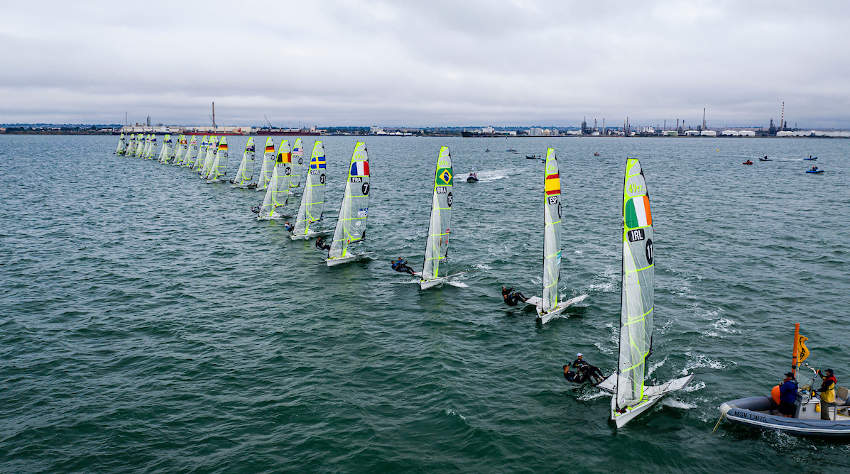 Ryan Seaton and Seafra Guilfoyle in action at the 49er Worlds in Australia last month | Photo: Jesus Renedo/Sailing Energy
Ryan Seaton and Seafra Guilfoyle in action at the 49er Worlds in Australia last month | Photo: Jesus Renedo/Sailing Energy
The Finn is a dinghy not normally associated with Donaghadee Sailing Club, but DSC member Oisin McClelland is another contender.
Campaigning in the men’s heavyweight Finn class since 2015, McClelland has secured several top 32 World and European finishes. In January he finished fourth in the Miami World Cup Series event, just narrowly missing out on a bronze medal.
He says: “Really nailing down all elements that make up a successful Olympic campaign was definitely difficult at the start but over time I have been able to get consistent and make big improvements.”
Ballyholme’s Liam Glynn is also gearing up for the challenge in Genoa. Rising through the youth and U21 ranks, he has secured a world junior title and U21 bronze along the way and recently achieved a personal best finish in the Laser at the recent World Championships in Australia.
As part of the Irish Performance Laser squad, the Bangor sailor has been training hard, with a typical day including up to six hours of training, looking at racing skills and focusing on nutrition and recovery.
Commenting on his Olympic campaign so far, Glynn says: “I am motivated by my love of the sport, the feeling when you are in the zone and perfecting your technique and strategy amongst the best sailors in the world.”
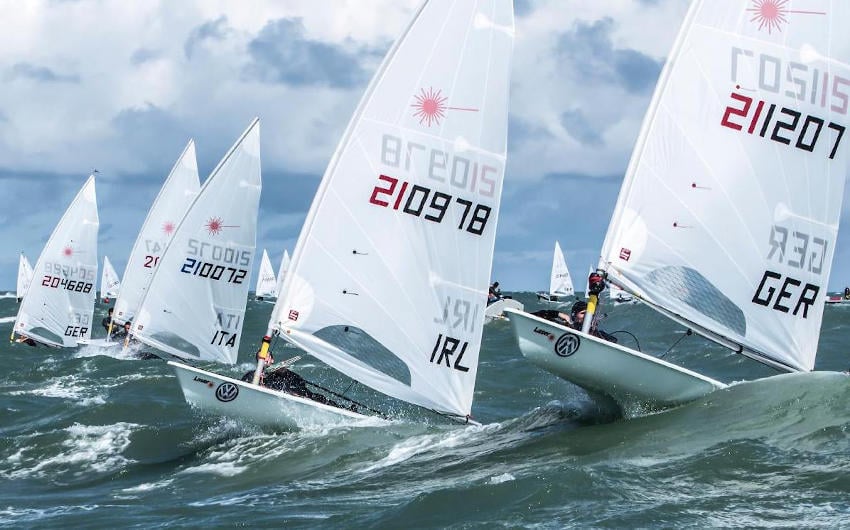 Liam Glynn recently scored a personal best result in the Laser
Liam Glynn recently scored a personal best result in the Laser
All three sailors graduated through the RYA Northern Ireland’s Performance Pathway and are funded through Sport Northern Ireland. Seaton and Glynn are members of the Irish Performance Team.
In sailing, nations can qualify in 10 Olympic disciplines but just one boat is eventually selected to represent each nation in each discipline.
For the NI athletes, their last chance for a European place in the Finn, Laser and 49er fleets is up for grabs at the Sailing World Cup next month.
RYA Northern Ireland’s chief operating officer Richard Honeyford, is looking forward to supporting the sailors as they make their final preparations.
“For all three boats the focus is now on one event in April and for the final chance to secure their place at Tokyo 2020,” he says. “All three have worked extremely hard during this Olympic cycle, with vast amounts of training, competing and travel to achieve their goal.
“At RYA Northern Ireland we are proud of how well they have applied themselves and their inspirational role as ambassadors for sailing in Northern Ireland.
“We look forward to the sailing community supporting them as they undertake this final challenge for Olympic qualification.”
Royal Irish's Saskia Tidey on Stage at RYA Dinghy Show
This weekend's RYA Dinghy Show was opened by members of the British Olympic Sailing Team including Dun Laoghaire's Saskia Tidey of the Royal Irish Yacht Club who will be competing in the 2020 Tokyo Games this summer.
Alexandra Palace, London, has transformed into a dinghy sailing paradise and the theme is ‘World of opportunity-see where dinghy sailing can take you’.
Tidey, who sailed for Ireland in Rio but switched to Team GB for Tokyo because of lack of opportunity in Ireland, recently finished second at the 49erFX World Championships with partner Charlotte Dobson from Scotland.
Tidey's fellow Olympian Sarah Ayton commented on the show: “We’re really excited to officially launch the 2020 show - the atmosphere is already fantastic! It always amazes me the range of boats here, all the things you can buy. We’ve also got a whole line up of brilliant speakers so this weekend, come and escape the rain and enjoy a day out here at the Dinghy Show!”
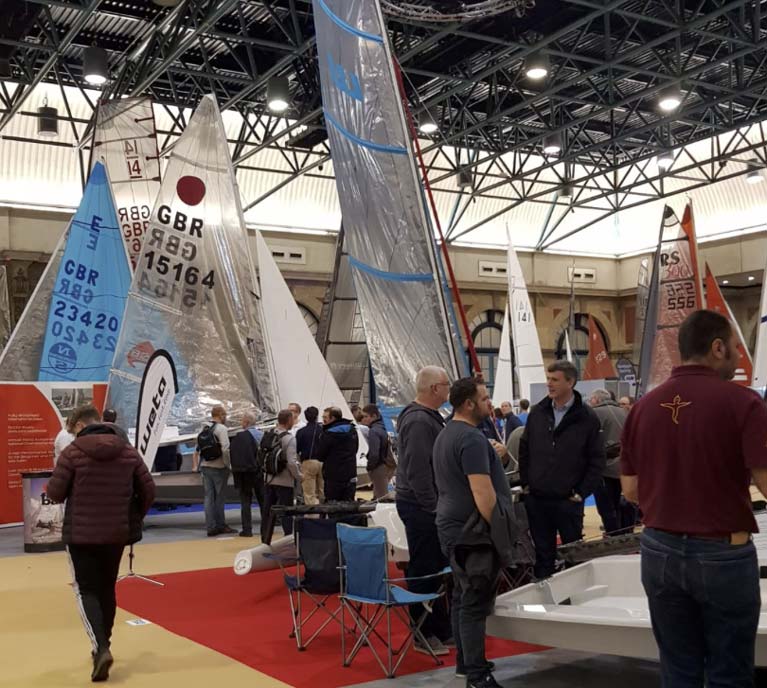 The Dinghy Show in full swing
The Dinghy Show in full swing
Visitors of all ages are able to enjoy family-friendly show favourites including the 360° ‘On the Water’ VR experience, sailing simulators and the model boat pool. You’ll also find a brand new line up of expert speakers across three stages
If you haven’t already got your ticket, weekend (£24) tickets are available to buy on the door. The show is open from 10:00 - 18:00 10:00 - 17:00 on Sunday 01 March.



























